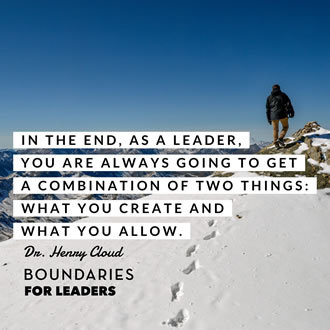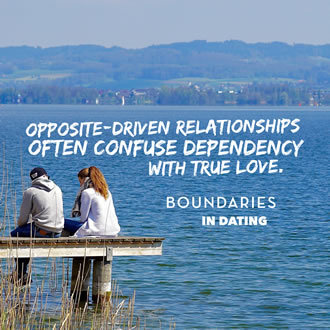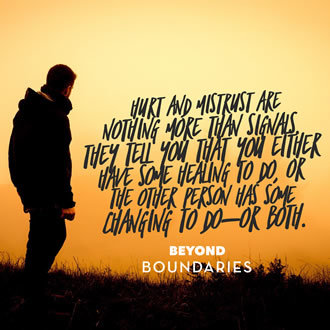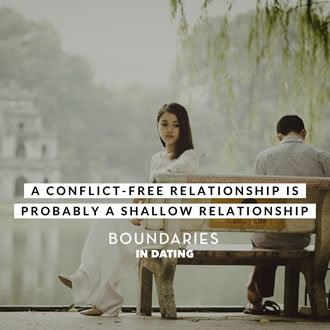Henry Cloud's Blog, page 8
March 16, 2019
The Secret to a Successful Marriage (Hint: It Involves Boundaries)
 When two people marry, two lives blur together to make a new one, two become one. The blurring of expectations and feelings can become an issue. Many times a spouse will automatically expect that the love in the marriage means that her spouse will always see things her way. She may feel unloved when her otherwise-loving mate says, “No, I’d rather not take a walk. I’m sleepy.” Sometimes this happens during the “honeymoon period,” when both parties tend to see eye-to-eye on everything. But when the reality of two different wills, needs, and perspectives comes in, the honeymoon is over. This is when the Law of Respect must be applied.
When two people marry, two lives blur together to make a new one, two become one. The blurring of expectations and feelings can become an issue. Many times a spouse will automatically expect that the love in the marriage means that her spouse will always see things her way. She may feel unloved when her otherwise-loving mate says, “No, I’d rather not take a walk. I’m sleepy.” Sometimes this happens during the “honeymoon period,” when both parties tend to see eye-to-eye on everything. But when the reality of two different wills, needs, and perspectives comes in, the honeymoon is over. This is when the Law of Respect must be applied.
For example, a couple with whom my wife and I (Dr. Cloud) are close, Nick and Colleen, mentioned the same problem at dinner one night. Nick said, “Sometimes Colleen withdraws from me for no reason at all.”
“There is a reason,” Colleen replied. “When I try to say no to you and you try to control me, I withdraw.” Nick said, “I don’t try to control you when you say no.” Colleen let it go and said, “I guess we have a difference of opinion.”
The conversation drifted to other subjects. Later that evening, Nick invited me to a ball game a couple of weeks from then. I checked my schedule and said, “Sorry, I can’t.” Nick threw up his arms in mock exasperation and said, “Oh, come on, you can go! Just rearrange things a little. That’s what friends do.”
Colleen had been watching, and she yelled, “There it is! There it is! That’s how he controls my no!” Nick looked surprised and said, “I do what?”
“She’s right, Nick,” I said. “I felt the pressure of not being able to say no.” The light went on for Nick as he saw how his desire for good things sometimes crossed the line of respect.
When you apply the Law of Respect in your marriage, don’t storm into the living room with a list of “how things are going to change around this house.” Tell your spouse you want your boundaries respected, and ask him if he feels his are being respected also. Let him know that you value and desire him to be free to say no, even if you don’t like the answer. Ask him some of the following questions:
How might I be crossing your boundaries?
Do you feel I respect your right to say no to me?
Do I give you guilt messages, withdraw, or attack you when you set a limit?
Will you let me know the next time I don’t respect your freedom?
These humbling and uncomfortable questions show you are concerned for your spouse more than for your own convenience. They arise out of self-sacrifice, and they show your generosity of spirit and love. And they can bind your marriage together.
________
Click to Tweet: When you respect your spouse’s boundaries, you are paving the way to having yours respected.
________
If your spouse is trustworthy, it is easier to ask these questions. If your spouse is untrustworthy, you may feel you are putting yourself in the hands of someone who might use your respect for him against you. However, even untrustworthy people need to have their legitimate needs and boundaries respected. This doesn’t mean, though, allowing yourself to be harmed if the spouse is unsafe. Respect his boundaries and still set limits on his untrustworthiness.
An example of this balance is how a wife might approach her rageaholic husband. She should not dictate to him that he can’t be angry; she should respect his freedom to protest what he does not like. At the same time, however, she might tell him, “Your raging way of being angry is not acceptable to me. If you don’t find other ways of being angry with me, I will have to distance from you.”
Respecting and valuing your mate’s boundaries is the key to being close and loving. Your spouse experiences the gift of freedom from you and sees the love you are extending in giving this freedom. When you respect your spouse’s boundaries, you are paving the way to having yours respected.
________
Learn how to help your marriage flourish by reading Boundaries in Marriage.
The post The Secret to a Successful Marriage (Hint: It Involves Boundaries) appeared first on Boundaries Books.
March 11, 2019
Why Leaders Need to Set Boundaries in the Workplace
 What do boundaries for leaders look like at work? They are made up of two essential things: what you create and what you allow. A “boundary” is a property line. It defines where your property begins and ends. If you think about your home, on your property, you can define what is going to happen there, and what is not.
What do boundaries for leaders look like at work? They are made up of two essential things: what you create and what you allow. A “boundary” is a property line. It defines where your property begins and ends. If you think about your home, on your property, you can define what is going to happen there, and what is not.
As a leader in the workplace, you are in charge of the vision, the people you invite in, what the goals and purposes are going to be, what behavior is going to be allowed and what isn’t. Leaders build and allow the culture. You set the agenda, and you make the rules. And what you find there, you own. It is your creation or your allowances that have made it be. Simply stated, the leaders’ boundaries define and shape what is going to be and what isn’t. In the end, as a leader, you are always going to get a combination of two things: what you create and what you allow.
I (Dr. Cloud) was leading an offsite for a health care company recently about a range of leadership issues, and the director of HR asked a key question. “So, how can you know if the problem is about the leader, or the follower?”
He went on to talk about “problem employees,” who don’t perform or who are difficult. “There is such a thing as a ‘follower’ who isn’t getting it, right?” he said.
“Sure,” I said. “But on whose watch? In whose culture? Who built the team that allows that? Who is over that employee that is a ‘problem’? And who is over the employee that allows employees like that to be that way? And if that employee is confused about the strategy or direction, who is it that sets that strategy and direction for their team or the organization? In the language of Apple, ‘who is the DRI , the directly responsible individual?’” Who owns it?
________
Click to Tweet: In the end, as a leader, you are always going to get a combination of two things: what you create and what you allow.
________
It is a central principle of boundaries: ownership. Ultimately, leaders own it. They are the ones who define and create the boundaries that drive the behavior that forms the identity of teams and culture and sets the standards of performance. Leaders define the direction and are responsible for making it happen. And they are responsible for the accountability systems that ensure that it does happen. It always comes back to leadership and the boundaries they allow to exist on their property. Leaders define the boundaries, and successful leaders define them well in several key areas:
The vision, the focus, the attention, and the activities that create forward movement are defined by leaders.
The emotional climate of the organization and its culture is created and sustained by leaders.
The unity and connectedness of the organization and the teams are built or fragmented by leaders.
The thinking and beliefs of the organization are sown and grown by leaders.
The amount and kinds of control and empowerment that people have are given and required by leaders.
The performance and development of their teams and direct reports are stewarded by leaders.
The leadership of oneself, which entails establishing one’s own boundaries and stewardship of the organization, is required by leaders.
By applying essential boundaries for leaders, you make sure certain things happen, prevent other things from happening, and keep it all moving forward. Leaders are a positive force for good and a negative force against bad. You know what they are for and what they are against.
________
Why does a company flourish under one leader while it declines under another capable individual? Why do some teams outperform other teams within the same company? Find out in Dr. Henry Cloud’s transforming book, Boundaries for Leaders.
The post Why Leaders Need to Set Boundaries in the Workplace appeared first on Boundaries Books.
March 4, 2019
The Two Types of Liars
 The ability to build a healthy relationship is based on the degree to which you are able to be clear and honest about everything, especially in a dating situation. Sometimes, people will deceive each other about the nature of other people in their lives. They may act like someone is “just a friend,” when in reality there is more of a history or more in the present than is being said.
The ability to build a healthy relationship is based on the degree to which you are able to be clear and honest about everything, especially in a dating situation. Sometimes, people will deceive each other about the nature of other people in their lives. They may act like someone is “just a friend,” when in reality there is more of a history or more in the present than is being said.
For example, I (Dr. Cloud) was working with a man named Frank who was trying to figure out his relationship with the woman he was dating. He had a funny feeling that something was wrong. It seemed that she was just a little too connected to her work. Frank had no problem with her loving her job, but there was something strange about her relationship with her boss. He did not think that she was dating him, or having any kind of illicit thing going on with him. But, he still got a funny feeling about her work and her connection with her boss.
Finally, Frank found out that his girlfriend had once been engaged to her boss. And, there was still some sort of continuing tie between them. But, as far as he had known, it was strictly a work relationship. Instead, she had been lying to him.
Frank felt horribly deceived, and from there the relationship went downhill. It did not falter because she worked with a former boyfriend, but because she had not been clear about the nature of her former relationship with her boss. Frank could sense some sort of tie that she was not owning up to. Later, when some other issues came up where she had not been clear with him, the relationship died. If she had not been deceptive about the former boyfriend, the later issues would not have been a big deal. But, once a pattern of lying starts, trust is difficult to reestablish.
Why do people lie, and how can you set appropriate boundaries? In our opinion, there are really two types of liars:
Liar Type 1:
There are liars who lie out of shame, guilt, fear of conflict or loss of love, and other fears. They are the ones who lie when it would be a lot easier to tell the truth. They want to be honest, but for one reason or another, cannot quite pull it off. They fear the other person’s anger or loss of love.
Liar Type 2:
There are liars who lie as a way of operating and deceive others for their own selfish ends. There is no fear or defensiveness involved, just plain old lying for love of self.
You will have to ask yourself if you want to take the risk and do the work if you are with the first type. There are people in the first category who have never had a relationship where they felt safe enough to be honest, and they tend to still be hiding. So, they lie to preserve love, or preserve the relationship, or avoid being caught in something because of guilt or shame. They are not really dangerous, evil characters, and sometimes when they find someone safe, they learn to tell the truth. This is a risk that some people want to take after finding out that deception has occurred. They hope that the person will be redeemed by the grace and love that they offer and will shoot straight with them from then on.
While we would not automatically recommend continuing a dating relationship with this kind of person, sometimes there is a good outcome. So, we do not want to make a rigid rule. But, our feeling is that dating is not a place for you to rehabilitate people. Rehabilitation should occur in that person’s counseling, recovery, discipleship, or some other context. For one thing, dating can become serious when your heart gets involved, and it may even lead to marriage.
Just because the person is lying out of fear does not make it acceptable, and serious devastation can occur even with fearful liars. No matter what the reason, lying destroys. By and large, the best policy is to stay away from those who lie for any reason.
Spend your time and heart on honest people. It is often too risky, from our perspective, to get involved with the fearful liar. If the person gets better and comes back repentant, that is one thing. But, you should not think that you are going to be the one who changes him or her if defensive lying is an ongoing pattern. There are some people who do this on occasion and confess it, and probably can be trusted over the long haul. But, patterns of this type are problematic. Whatever you decide to do, whether you stick in there or not, make sure that you do not go further until the lying issue is forever and certainly in the past. Remember the words of the wise instructor: Do not go on to other issues until the lying is solved.
The second kind of liar is a definite no-go. Tell him or her good-bye and save yourself a lot of heartache. Perpetual liars are not ready for a relationship, no matter how much you are attracted to him or her. Run, run, run!
A footnote: After Frank ended the relationship with his girlfriend, she soon was back with her former boyfriend (and boss). I told my client I thought he was lucky to have escaped her.
________
For more helpful advice to build the best dating relationship and find the love of your life, read Boundaries in Dating.
The post The Two Types of Liars appeared first on Boundaries Books.
February 25, 2019
Boundaries in Dating: Beware When Opposites Attract
 Setting wise boundaries in dating becomes more important as two people feel more attracted to one another, especially when they’re opposites in personality. However, one reason people are initially drawn to an individual with opposite traits is a pretty healthy one. It is that we are drawn to those who possess what we do not, so that we can internalize and own that trait for ourselves. This is a good thing, as that is how God designed the growth process. However, dating is not a good arena in which to develop oneself in a specific and important aspect of growth.
Setting wise boundaries in dating becomes more important as two people feel more attracted to one another, especially when they’re opposites in personality. However, one reason people are initially drawn to an individual with opposite traits is a pretty healthy one. It is that we are drawn to those who possess what we do not, so that we can internalize and own that trait for ourselves. This is a good thing, as that is how God designed the growth process. However, dating is not a good arena in which to develop oneself in a specific and important aspect of growth.
Take for example Lindsey and Alex. Lindsey was more of a lover than a fighter. She was good at caring and connecting with others, but she had a hard time with assertiveness and conflict. It seemed she often ended up having to put up with maltreatment or inconsiderateness from others.
Lindsey started dating Alex, who was her opposite in this area. Alex was strong, confident, and had no problems entering into conflict for what he believed was right. He had clear moral and spiritual values, was successful in his career, and took initiative to solve his problems. Lindsey was attracted to Alex’s strength. She was even more smitten when it helped her own life. For example, Lindsey’s apartment manager neglected to have an electrical wiring problem repaired after she had made several requests. She mentioned the problem to Alex over dinner.
The next day, he had called her manager, and the wiring was fixed within twenty-four hours. She was elated, grateful, and even more attracted to Alex. He certainly had other good qualities, such as being caring, responsible, and funny. But she felt a lot of relief when she encountered conflicts that Alex would handle for her.
With Lindsey and Alex the relationship continued to grow and deepen. However, Lindsey began relying more and more on Alex to enter into conflict that she felt ill-equipped to deal with. He negotiated with her garage mechanic over problems with her car. He talked to her boss about her weekend work hours. He even confronted her mother on how she used guilt to get Lindsey to make inopportune visits.
Finally, the confrontational Alex sat Lindsey down for their own confrontation. He explained, “I really love you, but I’m starting to feel some resentment. I don’t mind helping you; it makes me feel useful. But with some of these relationships you are afraid of dealing with, I’m feeling more used than useful.”
Lindsey understood what Alex was saying. She had been utilizing the “opposite-thinking” mentality to keep from working on her own growth—specifically, her fear of conflict, anger, and arguments. She agreed that she had been using Alex without realizing it, and she began working on assertiveness. She told him, “Let me know the next time I ask you to do my dirty work for me.” Alex appreciated her attitude, and the ability for setting boundaries in dating to improve their relationship.
We should use and appreciate the abilities of those who have what we don’t. However, the danger occurs when we make opposing styles or abilities a basis for relating to one another. At the outset of the relationship, this may seem like a good thing. You are complementing each other. You each provide what the other needs. You are stimulated by the other’s different point of view.
________
Click to Tweet: Opposite-driven relationships often confuse dependency with true love.
________
However, the danger of going for an opposite-type person is this: opposite-driven relationships often confuse dependency with true love. That is, people may feel intense longings and attractions for an “opposite” person. They may appreciate the “completion” they feel with that person. But they run the risk of simply needing that person for those functions, and never giving the true loving feelings any relationship needs to grow and flourish. Dependency is only part of love. It is not the full expression of love. The full expression of love is to give back from a full heart.
The story of Lindsey and Alex ends well, as the two eventually married and are happy together. But, without boundaries in dating, the problem could have resolved in very different ways, which we see in countless new relationships and marriages. For instance:
Alex could have quietly resented Lindsey, and the relationship could have disintegrated.
Lindsey could have disagreed with Alex, thinking it was his job in the relationship to solve these problems.
Alex could have used his confrontation abilities to control and manipulate her in the relationship.
Lindsey could have despaired at her inability to stand up for herself.
Lindsey could have resented Alex’s abilities, and seen him as domineering instead of working on becoming more assertive herself.
Resentment. Loss of Freedom. Confusion of Responsibilities. Parent-Child Struggles. These are not the hallmarks of a great relationship. Yet, these are the dangers that can happen when oppositeness rules. Had Lindsey not been a growing-type person, she may have remained conflict-avoidant, always looking to Alex to do that which she was afraid or unwilling to do.
While we are to go to others for help in areas, exhibiting boundaries in dating means we are still to take ownership of our lives. If you find yourself continually needing to go to your dates for things you should be doing yourself, you may be refusing to take ownership and grow in your own life. It is much better to go to non-dating relationships in order to mature and grow with the tutelage of others who have what you are working on possessing.
What does a relationship look like in which two people are opposite, but both are taking ownership of their lives? These are a few indications:
Each person is dealing with his own problems as his. They aren’t the other’s. It isn’t the other’s failure if we fail in an area that we aren’t strong in.
Both members love and appreciate the gifts and abilities of the other person. However, they see each other’s abilities as gifts, not as necessities to the relationship.
Each member is actively involved in pursuing spiritual completion and growth in his areas of weakness, not content to let the other do the work in that area.
This doesn’t mean that we shouldn’t be dependent on each other. God created us to be dependent on himself and others. But, dependency has an ultimate purpose: growth. We are to take in the love, comfort, and instruction of others in order to grow. Opposites often depend on each other. That is not a problem, as long as that dependency spurs each member on to spiritual and emotional maturity and completeness.
________
Learn more about how to build the best dating relationship with Boundaries in Dating.
The post Boundaries in Dating: Beware When Opposites Attract appeared first on Boundaries Books.
February 18, 2019
How to Risk Trusting Someone Again
 When you’ve been let down by someone who matters a great deal to you, moving beyond boundaries is not easy work — but it is important. One thing you can do in this regard is to figure out if the problem that was previously an obstacle is truly being transformed. In other words, is this person really changing? Is the big problem being solved the right way?
When you’ve been let down by someone who matters a great deal to you, moving beyond boundaries is not easy work — but it is important. One thing you can do in this regard is to figure out if the problem that was previously an obstacle is truly being transformed. In other words, is this person really changing? Is the big problem being solved the right way?
Here’s an example. I (Dr. Townsend) worked with a couple in which the husband, Bill, was a nice guy but irresponsible. He was one of those likeable people who loves to hang out with others and is a lot of fun. But Bill’s performance in life did not match up to his personality, especially in the area of finances and spending. He overspent on cars, gadgets, and entertainment. He also hid his spending habits, which meant his wife, Pam, was routinely surprised by huge credit card bills. These patterns took a major toll on the marriage. Pam was terrified of an uncertain financial future with him. She was not perfect and had her own issues as well, but his behavior came close to breaking up the marriage.
In our work together, Pam was clear that though she still loved Bill, she had lost all trust in him. She could not believe anything he said. “If he told me at noon that the sun was shining, I would go outside to check,” she said. As is common in these situations, Bill did not want to acknowledge the severity of the problem or make the necessary changes. He wanted Pam to change, to stop blaming him, and to learn to trust him. “If you would be nicer to me and trust me,” he said, “I would feel more supported, and I’d do better in my career.”
I had to step in there and say, “You are right; she shouldn’t be mean to you or attack you. But I don’t want her to trust you.”
Bill was bothered by that and said, “Don’t you want the marriage to work out?”
“Sure I do,” I said. “I want Pam to love you with no strings attached. But that is different from trust. While love is free, trust is earned. In the area of financial responsibility, I don’t want her to relax and trust you until we have evidence that you have changed.”
Again, Bill didn’t like that: “You’re both judging me,” he said.
“No,” I said, “neither of us is consigning you to hell. There is no judgment in this office. But you have not shown that you understand how deeply you have hurt her, nor have you made the necessary changes so that she can trust you again. If you and I were neighbors and I borrowed your screwdriver and didn’t return it, then borrowed your saw and didn’t return it, then your pliers and didn’t return them, what would you do if I asked to borrow your hammer?”
“Of course I wouldn’t lend it to you,” he said. “Okay, I see the point.”
Bill wasn’t as sorry as I wanted him to be at that point. He still didn’t seem to be able to acknowledge the impact he had on his wife, but it was progress.
________
Click to Tweet: Hurt and mistrust are nothing more than signals. They tell you that you either have some healing to do, or the other person has some changing to do—or both.
________
“Here’s the deal,” I said. “I want you to submit your finances to Pam on a monthly basis for a year. She is in charge. You both see a financial planner together. And we’ll see, month by month, if you are really changing for her sake and the relationship’s sake.”
I turned to Pam: “If he does what I am asking, would you be open to trusting him again?”
“I would,” she replied. “I want to get all this behind us. But it has to be real.”
They agreed to the plan. Bill did some blaming at first, which happens frequently. But he humbled himself and allowed her to be in charge of the money. As it turned out, Bill did fine. And Pam was able to get past her hurt and mistrust, because he had truly changed.
Hurt and mistrust are nothing more than signals. They tell you that you either have some healing to do, or the other person has some changing to do—or both. So, while monitoring if you are learning to trust again, also monitor how the other person is doing in the arena that caused a break in trust in the first place.
________
Beyond Boundaries shows you how to move past relational pain to experience the freedom and love God designed for your most important relationships. Click here to learn more.
The post How to Risk Trusting Someone Again appeared first on Boundaries Books.
February 11, 2019
How to Win a Titanic Power Struggle with Your Child
 In one family I (Dr. Townsend) know, seven-year-old Taylor was going through a titanic power struggle with his mother. Sometimes, she wondered if setting boundaries with kids was actually possible. Taylor fought any “do” or “don’t” she said. Finally, his mom went to his bedroom to talk to him. As she opened the door, a cup perched on the top of the door tipped over, covering her from head to toe with milk.
In one family I (Dr. Townsend) know, seven-year-old Taylor was going through a titanic power struggle with his mother. Sometimes, she wondered if setting boundaries with kids was actually possible. Taylor fought any “do” or “don’t” she said. Finally, his mom went to his bedroom to talk to him. As she opened the door, a cup perched on the top of the door tipped over, covering her from head to toe with milk.
Any parent would have blown up at her child. Instead, Taylor’s mom said, her face dripping with milk, “Son, this is really serious. I’m going to have to take some time to figure out what will be happening to you. I’ll let you know.”
The next few hours were excruciating for Taylor as he waited in limbo. By that time, the mom had called her husband and worked out a plan. The plan included restrictions on Taylor’s time—such as no TV, limited outdoor time, and limited friend time—and consequences—such as shampooing the carpet and learning how to use a washing machine to clean Mom’s clothes.
To avoid feeling like the bad guy, Taylor joked with his dad that evening about the incident, saying, “Dad, wasn’t that kind of funny?”
His dad responded with a straight face, “No, it was really mean, son. You went too far with your anger. It was hard on your mom.”
“But I saw it on a TV show, and it was a good trick.”
“Taylor,” his dad said firmly but not harshly, “I really don’t want to talk about any part of this behavior being funny. It just wasn’t.”
A few hours later, the boy’s mother overheard Taylor saying to his little sister, “No, Kelly, don’t laugh! The milk trick wasn’t funny. It hurts people.”
Taylor’s boundary with Kelly was far different from the one he had with Mom. It was love based and deliberate. Through some tough consequences with Mom and some verbal boundaries about reality with Dad, Taylor was metabolizing his own boundaries and becoming more empathic. He was developing a concern for the feelings of others.
Children will sometimes go through a “good as gold” season after a temper tantrum. They will do unasked-for favors for others or obey without a lot of resistance. If you have withdrawn from or attacked the child, this season may be an attempt to regain connection with you. But if you are maintaining your attachment to your child, this behavior may occur because your child has met your limit, feels less out of control and fearful of his own impulses, and feels safe. This leads to a sense of gratitude and warmth toward his family.
Children who live in protest mode are still dependent on other people. Like a pinball, they bounce from parents to siblings to friends, complaining about their poor treatment at the hands of others. Their feelings and actions are motivated by what others do or don’t do to them. Children with healthy boundaries, however, aren’t driven by the control of others. Their view of life, the decisions they make, and responses to their environment are dictated by their own internal values and realities.
You can help your child attain this important aspect of mature boundaries. When he is throwing a temper tantrum or acting in “protest mode,” remember to validate his feelings yet still hold to your limit or consequence. Then say, “You know, the more you fight me, the less time you have for things you like to do. Then it will be time for bed. I’m willing to stop the argument if you are, then you can go play. What do you think?”
If the child isn’t ready to stop, he thinks you don’t mean what you say. Don’t give in, and don’t keep arguing. Stick to your guns. Eventually, he should realize that as long as he is giving up all this time reacting to you, you are in control of his precious time. Having to go to bed with less playtime will help him understand the principle of time management and making the most of every opportunity.
________
Click to Tweet: If the child isn’t ready to stop [protesting], he thinks you don’t mean what you say. Don’t give in, and don’t keep arguing. Stick to your guns.
________
Your child needs to know that in protesting, he has only identified the problem, not solved it. A tantrum doesn’t solve anything. He needs to use these feelings to motivate him to action, to address the issue at hand. He should think about his responses and choose the best one available.
From a loving, firm position, you can help your child mature his reactive boundaries into love-and-reality-based proactive boundaries, helping him take control of his life, character, and morality.
________
Taken from the book Boundaries With Kids. Get more proven advice to raise kids who take responsibility for their actions, attitudes, and emotions in Boundaries With Kids.
The post How to Win a Titanic Power Struggle with Your Child appeared first on Boundaries Books.
January 30, 2019
Sizzling Passion and the Myth of Hollywood Romance
 To some extent, our society is afflicted by a Hollywood distortion about relationships. Don’t get me wrong—I (Dr. Townsend) am not anti-Hollywood. I am a movie person, and my sons are in school studying film. But we need to free ourselves of a distortion embedded in the DNA of the movie culture: passion trumps everything. That is, if you deeply connect on a romantically passionate level, you have entered relational Nirvana, and your love conquers all. This is the stuff of lots of great entertainment, but it is not how real relationships actually go to the next level.
To some extent, our society is afflicted by a Hollywood distortion about relationships. Don’t get me wrong—I (Dr. Townsend) am not anti-Hollywood. I am a movie person, and my sons are in school studying film. But we need to free ourselves of a distortion embedded in the DNA of the movie culture: passion trumps everything. That is, if you deeply connect on a romantically passionate level, you have entered relational Nirvana, and your love conquers all. This is the stuff of lots of great entertainment, but it is not how real relationships actually go to the next level.
For example, Sharon was dating Alex, a man to whom she was extremely attracted. He had many of the qualities she looked for: the same spiritual values, warmth, lots of friends, and ambition, and it didn’t hurt that he looked like a fashion model. Plus, he was an incurable romantic, and she loved that aspect of the relationship. Alex was the king of long nights, longing glances, flowers, endearing words, and great spots to have dinner. Sharon was smitten with this guy.
Then, reality reared its ugly head in the form of a tendency for Alex to be financially irresponsible. He was laid off from a job and wanted to crash at her place for a while. He borrowed money and didn’t repay it. Sharon thought she could solve the problem with a direct conversation. She told him that although she loved him, she really needed him to get his own place and pay her back or get on a regular payment plan. She needed to see some sign of fiscal responsibility.
Alex responded by evading the questions, telling her how attractive she was and how he wanted to take her to a great dinner and spend quality time with her. She was a little taken aback, because nothing he said corresponded to her statements. She tried again. This time he said he wanted to give her a massage! Finally, Sharon realized that Alex was not capable of dealing with reality and ended the conversation. It’s not surprising that she also ended the dating relationship shortly thereafter.
Though this sounds like an extreme example, it illustrates that some people can only relate to the opposite sex in the romantic or sexual arena. It’s as if they learned their entire repertoire on reality TV. An abundance of passion can certainly be attractive in the right context, but if there is nothing that goes beyond passion, such an individual is not ready for a relationship with you.
Passion has its own special place and usefulness in the relationship; it helps a man and a woman feel extremely close to each other, as sexual attraction temporarily diminishes the boundaries that separate two people. In the sexual embrace, each person feels a deep oneness with the other. It is pleasurable in and of itself and brings a great deal of intensely positive feelings into the relationship. It is part of the process of having children and families. And it is a symbol of how strong God’s love is for us as well, since he sees us as his bride: “Therefore I am now going to allure her; I will lead her into the wilderness and speak tenderly to her” (see Hosea 2:14). We can then learn much about our relationship with God by understanding and experiencing passion.
The benefit of passion is that it provides a buffer when reality emerges, and the couple finally has to face up to each other’s flaws. They may be minor, moderate, or major, but they are imperfections, issues, and sins that will not go quickly away. They are hard to live with, and they cause relational problems. But the buildup of the relational equity, the goodwill, and the positive affection will help smooth over the rough spots while the couple wrestles with adapting to and integrating the less pleasant realities. Mature love then develops. Mature love is when each person knows the good and bad of the other and loves the entire person anyway.
________
Click to Tweet: Mature love is when each person knows the good and bad of the other and loves the entire person anyway.
________
Couples who understand passion from a mature perspective get it all. They win the lottery. They are able to have great sexual experiences. And they are also able to move into great vulnerability and openness to each other that go deeper than passion. They don’t really give up anything. No couple with that sort of relationship would trade it for anything else. What can compare with an evening in which you share a fear or a need and receive deep empathy and understanding from your spouse as he safely explores who you really are at your core, followed by passion? These are some of the peak experiences shared by growing couples who do life right. And that’s the place of passion.
________
Learn how to discern when true change has occurred, develop mature passion that lasts, and restore relationships to a healthy dynamic in Beyond Boundaries.
The post Sizzling Passion and the Myth of Hollywood Romance appeared first on Boundaries Books.
January 25, 2019
Why Your Child Really Isn’t Perfect and What to Do About It
 Children need more than a parent who will talk about boundaries. They need a parent who will be boundaries. This means that in whatever situation arises, you respond to your child with empathy, firmness, freedom, and consequences. This is how God handles his children, and he is our model. But, sometimes parents contribute to the problem by trying to justify their kid’s behavior, rather than addressing the issue.
Children need more than a parent who will talk about boundaries. They need a parent who will be boundaries. This means that in whatever situation arises, you respond to your child with empathy, firmness, freedom, and consequences. This is how God handles his children, and he is our model. But, sometimes parents contribute to the problem by trying to justify their kid’s behavior, rather than addressing the issue.
Setting boundaries with kids isn’t about “making” your child do anything. It is much more about structuring your child’s existence so that he experiences the consequences of his behavior, thus leading him to be more responsible and caring. Use the following three key steps to help begin the process with your kids:
Step 1: Acknowledge that your child is not perfect.
All kids are immature sinners; this is our human condition. Some parents have difficulty with this first step. They deny their child’s behavior. They rationalize genuine problems. For example, smarting off becomes a cute sense of humor. Laziness becomes fatigue. Intrusiveness becomes high-spiritedness.
Parents rationalize their child’s problems for many reasons. Some do it to avoid guilty feelings. Some don’t want their own perfectionism challenged. Some feel as if their child is being victimized. Others don’t want to be embarrassed. Still others don’t want to go through the effort of disciplining. Parents need to look at the possibility that they might be sacrificing their child’s well-being to protect their own sense of comfort and well-being. God never denied our craziness, and he went through the ultimate discomfort to solve the problem. Be a parent.
Step 2: Identify problems that aren’t really problems
After acknowledging that your child isn’t perfect, the next step is to identify that some of your child’s behavior problems aren’t really the problem. The action or attitude driving you crazy isn’t the real issue. It is the symptom of another issue, which in many cases is a boundary problem. Your child’s behavior may be driven by something broken or undeveloped within her character. The symptom alerts you to the inner problem.
Don’t just react to the symptom, or you will be guaranteeing more problems later. Parents often have a knee-jerk reaction in a crisis, then back off from their job when the crisis resolves. A boundaryless child will have symptoms until she develops boundaries. Here are some examples of problems that aren’t really the problem:
Outward Problem:
Boundary Problem:
Bad grades
Lack of concern about consequences
Controls other kids
Lack of respect for other’s boundaries
Doesn’t listen to instruction
Lack of fear of consequences
Defiant attitude
Lack of boundaries or entitlement
Step 3: Realize that time does not heal problems
The third step you will need to come to terms with is that time does not heal all. Many parents avoid addressing boundary problems because someone told them, “Just wait it out. They’ll get older.” Yes, your kids will get older. But, how many 42-year-olds do you know who are getting older but still have no boundaries? Time is only a context for healing. It is not the healing process itself. Infections need more than time; they need antibiotics.
In fact, avoiding dealing with problems in your child simply gives the Devil more opportunity to stunt his growth (see Ephesians 4:26-27). Time is a necessary but not sufficient condition for boundary growth and repair. You also need lots of love, grace, and truth for your child. Get involved in the repair process. With nothing but time, things do not improve, but break down further.
________
Click to Tweet: Time is a necessary but not sufficient condition for boundary growth and repair. You also need lots of love, grace, and truth for your child.
________
The words “parenting” and “problems” sometimes seem to be redundancies. You may simply be preventing problems in your child. Or you may have a troublesome situation that is breaking your heart. Yet, God has anticipated it, is fully aware of it, and wants to help you to help your child develop boundaries. He has provided hope for your and your child’s future that is real and helpful.
Don’t give up on your child, even as they enter adulthood. You are the only mom or dad they will ever have; no one in the world has the position of influence in their heart that you do.
________
Get more proven advice to raise kids who take responsibility for their actions, attitudes, and emotions in Boundaries With Kids.
The post Why Your Child Really Isn’t Perfect and What to Do About It appeared first on Boundaries Books.
January 18, 2019
How Intimacy Can Be Realized Through Conflict
 What is your normal reaction when conflict occurs in a new relationship? Are you comfortable addressing the issue? Or, do you stuff the issue out of fear or a desire preserve the peace? Honesty is the best policy for two important reasons:
What is your normal reaction when conflict occurs in a new relationship? Are you comfortable addressing the issue? Or, do you stuff the issue out of fear or a desire preserve the peace? Honesty is the best policy for two important reasons:
Being honest helps resolve the hurt or the conflict.
When you are honest, how the other person responds tells you whether a satisfactory relationship is possible.
If you are hurt in some way, bring it up. Don’t harbor bitter feelings. Or, if there is something that the other person has done that you do not like, or goes against your values, or is wrong, it must be discussed. If you don’t, then you are building a relationship based on a false sense of security and closeness. And it is possible that your feelings will be confused by hurt and fear. A lot is lost in not finding out who the other person is and where the relationship could really go, if one or both people are not facing hurt and conflict directly. In reality, a conflict-free relationship is probably a shallow relationship.
Second, you need to find out if the person you are with is capable of dealing with conflict and hurt directly. The Bible and all relationship research is very clear on this issue: people who can handle confrontation and feedback are the ones who can make relationships work. You must find out, sooner rather than later, if the person you are with is someone you can talk to. If you get serious with someone who cannot take feedback about hurt or conflict, then you are headed for a lifetime of aloneness, resentment, and perhaps even abuse.
Proverbs puts it well about a person who cannot take confrontation: “Do not rebuke a mocker or he will hate you; rebuke a wise man and he will love you” (Proverbs 9:8). “A mocker resents correction; he will not consult the wise” (Proverbs 15:12).
Whether you’re dating someone, starting a new friendship, or building a business alliance, you need to know if you are in a relationship with someone who is going to be defensive when you bring up hurt or conflict, or if you are with someone who is going to be able to listen, learn, and respond. If you do not deal with conflict early on, and the relationship gets serious, then you have bought yourself a world of trouble.
Honesty over hurt and conflict creates intimacy, and it also divides people into the wise and the foolish. But being honest is totally up to you. You cannot control what the other person does. However, you can decide what kind of person you are going to be. As a result, you will also be deciding what kind of person you are going to be with.
________
Taken from Boundaries in Dating: How Healthy Choices Grow Healthy Relationships by Dr. Henry Cloud and Dr. John Townsend. Click here to learn more about this helpful book and read a sample chapter.
The post How Intimacy Can Be Realized Through Conflict appeared first on Boundaries Books.
January 14, 2019
Why People with Unhealed Wounds Attract Unhealthy Relationships
 Unhealed relational wounds drive us to compulsive attempts to repair the damage. That is, without being aware of it, we seek out people we believe can “fix” what’s wrong with us or help us find a piece of ourselves we feel is missing. We function emotionally like the starving man who looks in a dumpster and sees lunch instead of garbage. His perception is so driven by his need that he is willing to eat something that might make him sick.
Unhealed relational wounds drive us to compulsive attempts to repair the damage. That is, without being aware of it, we seek out people we believe can “fix” what’s wrong with us or help us find a piece of ourselves we feel is missing. We function emotionally like the starving man who looks in a dumpster and sees lunch instead of garbage. His perception is so driven by his need that he is willing to eat something that might make him sick.
Though we may not be aware of it, something in us wants completeness. God has “set eternity in the human heart” (Ecclesiastes 3:11), and we long for him and the full life he promises. But if we remain unaware of the powerful forces at work within us, such as our family dynamic and how we responded to it, we can be blind to its influence and seek out the completeness we lack by making all the wrong choices. For example, consider the following scenarios:
The overly nice person lacks assertiveness and the ability to confront, so he attracts controlling and aggressive people.
The overly angry person can’t allow herself to feel helpless or sad, so she finds empathic people who won’t confront her moods.
The rigid, black-and-white person is not able to let go of control, so he seeks out spontaneous, creative people who won’t try to control him.
The over-responsible, guilt-ridden person lacks self-care, so she finds self-absorbed people who care for no one but themselves.
Of course, the problem is that these kinds of responses do not reflect God’s intentions for us. And they don’t lead to healthy or fulfilling connections.
These missing pieces are part of what is called the “internalization process.” We become who we are by incorporating experiences that we have with other people. On a developmental level, kids come into this life incomplete. In the process of healthy development, they receive safety and acceptance and develop assertiveness, self-control, and self-care that prepare them for life on their own. Once internalization is complete, we become functioning adults who are called to pursue wholeness; or, in Jesus’ words, “What I’m saying is, Grow up. You’re kingdom subjects. Now live like it. Live out your God-created identity” (Matthew 5:48).
What Jesus means is that he wants us to be mature and complete. But we are not complete. We have missing pieces—soul holes we carry from childhood into adulthood. The path to completeness or wholeness is to find a relational context, such as a healthy church, small group, mentor, or therapist, who can help us finish the emotional work that enables us to grow into the capacities we lack and become who we are meant to be.
________
Click to Tweet: ‘You complete me’ is a great line from the movie, ‘Jerry Maguire,’ but it doesn’t work in real relationships.
________
This is especially important in romantic relationships, where there is often a glitch in our emotional hardware. We feel strongly that the other person will complete us, but not in the way I am describing. It is not about becoming more connected, intimate, assertive, or real. It is about being in the presence of someone else who has those attributes without having to take responsibility to learn them.
“You complete me” is a great line from the movie, “Jerry Maguire,” but it doesn’t work in real relationships. You can’t outsource health. You must learn it all and take it inside your skin. Complete people then attract other complete people. That is why most of us need to put less energy into romance and more into personal growth. It pays off later in romance.
Understanding your missing pieces also pays off in other ways. Perhaps your concern isn’t about a marriage or dating relationship. It may be that the difficult relationship you need to address is with your parents, siblings, or a person from your childhood. Or it’s about a work relationship. Whatever your interest, you will find great benefit, in looking at the missing pieces, to understanding why things ended up like they did. The more information, the better for you.
________
Don’t let unhealed relational wounds or the pain of a past relationship affect your future. You can prevent the past from repeating itself. Read Beyond Boundaries to discover how to tell who you can trust, when the time is right to be vulnerable, and learn the keys to identify a healthy relationship. Learn More
The post Why People with Unhealed Wounds Attract Unhealthy Relationships appeared first on Boundaries Books.



